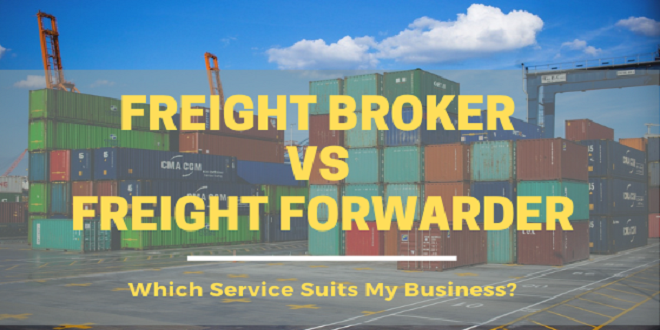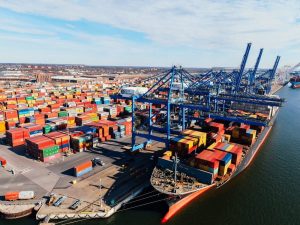Freight Forwarder vs Freight Broker: Which Service Suits my Business?

Image Source: Google Drive
Alt-Text: Freight Broker Vs Freight Forwarder Banner
If you’re in the market for freight services, you may be wondering what the difference is between freight forwarders and freight brokers. These services are integral to the shipping process, but they serve different purposes.
In this blog post, we will discuss the critical differences between freight forwarders and freight brokers so that you can make a precise judgment concerning which service is right for your business.
What is a Freight Forwarder?
Freight forwarders are shipping and logistics companies that handle the logistics of shipping a product over long distances by securing space on a ship or plane and ensuring that the product is given to the correct person at the right location.

Image Source: PEXELS
Alt-Text: Cargo Ship unloading Containers in the Port
Freight forwarders are essential to shipping and logistics because they arrange the transportation and delivery of your products to ensure they are compliant with the laws of different countries and are delivered on time and in good condition. Furthermore, they facilitate the movement of products between carriers and assist you in getting your products delivered to the correct location by creating a manifest of the products being shipped.
Freight forwarders also deal with customs, VAT, and other taxes, which can become complicated depending on the shipped product or service. Freight forwarders usually work for a commission, which is included in the overall cost of shipping your product.
Duty and Responsibilities of Freight Forwarder Company
Freight forwarders take care of the following duties and responsibilities:
- Provide transportation and delivery of your product to the correct location.
- Connect your business to different carriers to ensure that your product is delivered on time.
- Act as a liaison between the carrier and your business.
- Ensure that your product is compliant with all local, state, and federal laws.
- Provide a manifest of your product, including the value of the product being shipped.
- Arrange for any customs and local, state, and federal taxes.
- Provide carrier liability coverage.
Benefits of Using Freight Forwarder
Using a freight forwarder can offer many benefits to your business, including:
- Save Time: Two-way communication between freight forwarders and shipping carriers ensures that your shipment is delivered on time.
- Lower Shipping Costs: Arranging the shipping through a freight forwarder often results in significant savings in shipping costs.
- Peace of Mind: Your shipment is handled by someone trained in the industry, so you can rest assured that an expert in shipping will govern your freight.
- Reduce Liability: Freight forwarders help reduce liability by arranging for liability coverage, inventory control, and a manifest for your products.
- Reduce Hassle: Freight forwarders handle any red tape associated with customs, taxes, and other regulations that can cause delays or additional costs.
If you’re wondering how to arrange a freight forwarder, you may already be making inquiries with potential carriers. In this case, it is essential to make sure that you research your potential freight forwarders and find out whether they have the qualifications and experience to ensure your shipment will be given on time, in good shape, and to the correct location.
For instance, Zggship freight forwarder in China has 11 years of experience, they have served thousands of customers, and have a very good cooperative relationship with major transportation companies.
What is a Freight Broker?
Freight brokers also help ship products from one location to another. Still, they work for a percentage of the product’s value being shipped and are not responsible for any transportation or delivery. Freight brokers do not have to worry about securing space on a ship, plane, or truck. The responsibility for transportation is left to the freight forwarder.
A freight broker is essentially an intermediary between you and the shipping carrier. They help negotiate prices and contracts for you and take responsibility for collecting any local, state, and federal taxes. Freight brokers are essential to the shipping industry as they help save money on shipping prices and take the hassle out of attempting to negotiate contracts with shipping carriers.
However, it is essential to note that not all freight brokers are experts in every industry, so you must be sure to work with a freight broker with industry-specific expertise and knowledge of international laws.
Duty and Responsibilities of Freight Broker Company
Freight brokers take care of the following duties and responsibilities:
- Negotiate contracts with shipping carriers and assist you in finding a carrier that best fits your needs.
- Negotiate prices for you and help you find the most efficient shipping option for your product.
- Arrange for any customs and local, state, and federal taxes.
- Collect any carrier liability coverage.
- Take responsibility for any payments your business owes to shipping carriers and any other service providers.
Benefits of Using Freight Brokers
When you use freight brokers, you may enjoy certain benefits, including:
- Reduced Costs: Freight brokers negotiate the best deals for you to save money on shipping.
- Ease of Use: Freight brokers take care of the paperwork and make sure that everything is completed according to the terms of your business contract.
- Increased Profit Margins: Freight brokers help increase your profit margins by negotiating contracts and finding the best shipping rates.
- Get the Job Done: Freight brokers work to ensure that your shipment is delivered on time and in good condition.
- Reduced Liability: Freight brokers help reduce liability by arranging for liability coverage, inventory control, and a manifest for your products.
- Ensure that Your Products are Compliant with Local, State, and Federal Laws: Freight forwarders take care of the shipping procedure from start to end and ensure that your products are compliant with the laws of the state and country where you are shipping.
Which Service Is Best for Your Business?
If you’re in the market for freight services, you may wonder which service is best for your business. The decision will depend on your precise needs and the type of shipping products. If your transportation needs are relatively straightforward, then a freight broker may be a good option for your business.
If your transportation needs are more complex and require specialized services, you may find that a freight forwarder is a more appropriate option. It is also essential to cite that freight forwarders may also act as freight brokers in some cases. Still, in most cases, you will be dealing with separate companies, which are essential to the successful transportation of your products or services.
In the case of freight brokers, the freight forwarder acts as a liaison between you and the shipping carrier and handles any issues that may arise during transportation or delivery. This is because freight brokers do not have to deal directly with the shipping carriers and freight forwarders and can instead focus on the task of negotiating contracts for you.
So the critical difference between freight forwarders and freight brokers comes down to the role these services play in the transportation of your products. Freight forwarders take a different active role in the transportation of your products, while freight brokers play an intermediary role between the shipping carrier and your business.
Final Words
Freight Forwarders and Freight Brokers are both essential components of the shipping industry and work to ensure the smooth transportation of your product. Whether you’re shipping produce, mail, or other products and services, it is essential to find a service that fits your business needs and provides the best quality service at the most reasonable price.
Freight forwarders and freight brokers both provide similar services, but they differ in how they facilitate shipping. Freight forwarders take a more active part in the transportation of your products and help to make sure that your products are delivered to the correct location on time.
Freight Brokers work to negotiate and secure the best deals for you and act as an intermediary between you and the shipping carriers and freight forwarders, providing support but not taking responsibility for any duties or responsibilities.





